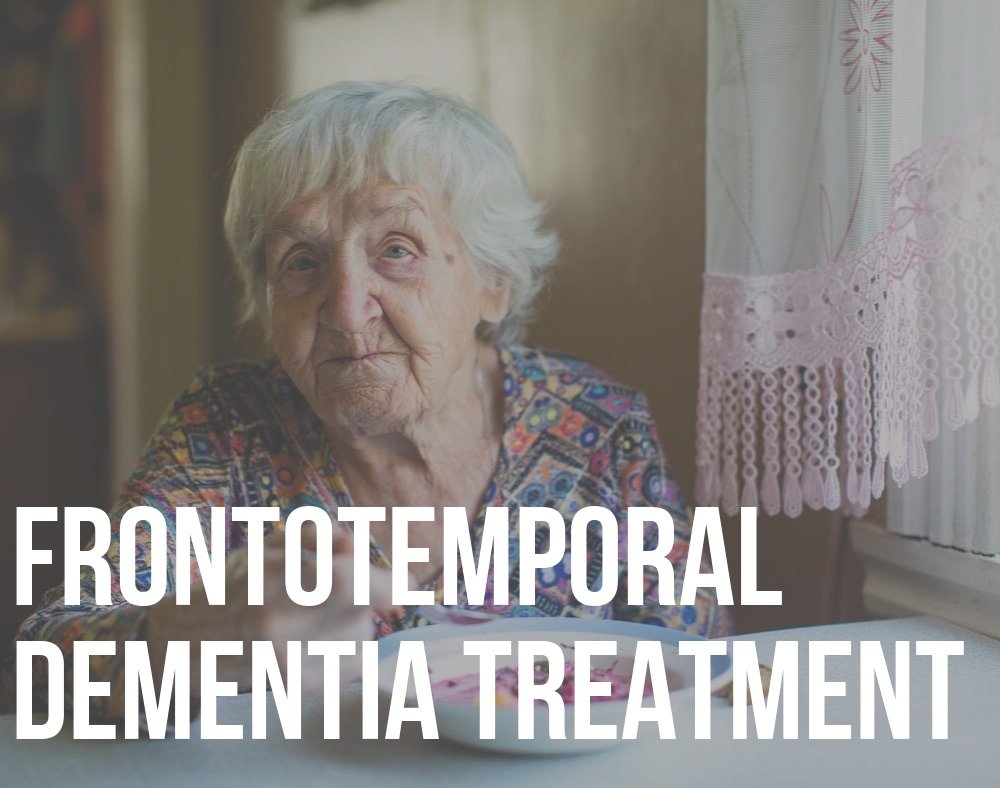It is important to understand the right approach to frontotemporal dementia treatment and how you can ease and alleviate the condition.
Frontotemporal dementia or FTD is a group of disorders that develop when there is a progressive loss of nerve cells in the frontal or temporal lobes in the brain.
When this happens to an individual, it can affect their movement, behavior, language, and personality. If you get a positive diagnosis for FTD, the first question you may ask is how to get treatment.
Sadly, there is currently no treatment available to cure, prevent, or slow down the decline of FTD.
However, there are a couple of frontotemporal dementia treatment options that affected individuals can try out. These may help take care of some of the symptoms they experience, ultimately improving quality of life.
Worth noting is that FTD is not life-threatening and many people live with it for years.
Best Frontotemporal Dementia Treatment
Medication

Doctors can prescribe different types of medication to a person who has FTD to ease some symptoms. These are usually off-label drugs that are approved for one purpose but are used for another purpose.
Before settling on the drug that a person should take, medics usually ask caregivers and the person with dementia what the most problematic symptom is.
The professional then targets to treat this first. Some of the most common drugs that a person can include in a frontotemporal dementia treatment plan include:
Antidepressants
There are very many drugs in the market available to help treat depression. That can also come in handy for a person who has FTD. They can help to control obsessive-compulsive behaviors, treat anxiety, and other signs of the disease.
Drugs like trazodone can assist with behavioral problems. SSRIs (selective serotonin reuptake inhibitors), on the other hand, have proven to be helpful when it comes to treating multiple FTD behavioral symptoms.
They include agitation, depression, apathy, and anxiety amongst others.
Drugs that most people take include Zoloft and Luvox. Professionals deem these agents relatively safe to be taken by persons who have dementia.
Sleeping aids

An individual can use this to help ease sleep disturbances like insomnia.
Antipsychotic drugs
Doctors usually recommend these to help reduce compulsive and irrational behaviors. The medications which are also known as neuroleptic drugs have a reputation for affecting motor functioning negatively.
However, new generation antipsychotic drugs like Zyprexa and Seroquel are normally well-tolerated.
Cholinesterase inhibitors
Some people will be also be put on cholinesterase inhibitors to experience some improvement or temporary stabilization in memory/attention in global functioning and day-to-day activities.
Anticonvulsants
This class of medicine can act as mood stabilizers. A doctor may advise a person to take these alone or in conjunction with other drugs, specifically antipsychotic medication to manage agitation.
Tegretol and Depakote can help manage extreme behavior symptoms.
Dopaminergic Agents

Some studies reveal that some drugs can help with enhanced initiation and speech fluency. These are medications that an individual takes to supplement the dopamine brain neurotransmitter system.
Persons with Parkinson’s disease are the ones who mostly take these drugs. In small doses, the medication might also reduce involuntary movements that some persons with FTD have.
Medroxyprogesterone
Some persons with frontotemporal dementia may show signs of sexual disinhibition. Because this can be distressing medics might recommend medroxyprogesterone which is a hormone progesterone derivative. In some cases, this is useful for calming sexual urges.
Clinicians have to weigh the advantages and disadvantages of using drugs before recommending a prescription. This is because some drugs may have dire side-effects; thus, they end up creating a bigger problem instead of offering a solution.
Others might also interact with other medications that a person is already taking.
In most cases, the doctor will proceed on a start slow approach to see if the medication will be tolerated. The expert then decides whether it is prudent for the person to continue taking the drugs or look for an alternative.
Therapy

Persons who have FTD are also advised to consider different types of therapies when coming up with a frontotemporal dementia treatment plan.
Examples of therapies that might help include:
Language and speech therapy
Experts can work with an individual to help improve communication problems.
This, at times, also assists with swallowing issues.
Physiotherapy
This comes highly recommended for people who have movement challenges because of FTD.
Occupational therapy
A person goes in for this type of therapy so that therapists can identify major problem areas in their daily lives.
These can include difficulties in eating, taking a shower, or getting properly dressed. The professionals of occupational therapy then go ahead to help come up with practical solutions.
Clinical Trials

Researchers and other experts are constantly working hard to make strides in the frontotemporal dementia treatment front.
This implies that a person who has FTD can volunteer to join a clinical trial that is experimenting with new tests, interventions, and treatments.
It is one of the approaches that can help to introduce new methods that are possible to detect, prevent, manage, or even treat the disease.
It is crucial to do thorough research before joining any clinical program to ensure that you will not be compromising your health at the end of the day.
Each clinical trial typically follows a protocol that has been predefined, including:
- Clear criteria for eligible persons
- In-depth information about the purpose of the trial
- The experts conducting it and how they will be doing it
- Potential benefits and risks
With most trials, a person does not have to pay to join. The experts usually cover costs like travel expenses for the participants.
Home and Lifestyle Remedies

Away from frontotemporal dementia treatment options that mainly require professional help, there are some lifestyle and home remedies that can also prove valuable to individuals with FTD like:
1. Accepting the help of the caregivers. As the illness progresses, a person with FTD might not be able to do everything on their own; thus need some assistance from relatives, friends, and other professionals.
These are people who will come in to lend a hand when it is needed as you go about your daily activities. They will also offer transportation, maintain safety and assist with finances.
2. Engaging in exercises that are suitable for your skill level is also good for your health. Not only will this keep you in shape, but it will also help enhance thinking skills and mood.
3. Proper nutrition is also advisable for anyone who has FTD. There are plenty of resources that a person can use to see the best foods and drinks to eat to get the nutrients and energy that is needed to tackle the disease.
4. Stress management is also crucial to everyone who is battling FTD. Try and find things that make one happy and relaxed. The activities that a person engages in should be stimulating and enjoyable and most importantly, should be of their choosing.
While lifestyle changes will not reverse or stop the progression of the illness, they can help to protect brain functioning and offer other benefits that will see a person lead a more fulfilling life even with the disease.

Extra lifestyle changes
Your physician will also discuss any lifestyle changes that you need to make along the way. For instance, it may reach a point where you are not able to drive safely again.
Creating a comfortable environment for the person with FTD can also help them cope better with the signs and symptoms they are going through.
This can be done by making sure that there is nothing in sight that upsets the person with dementia. The home should also have minimal noise and be well-lit.
Other frontotemporal dementia treatment plans that might come in handy for persons with FTD like:
1. Engaging in relaxing techniques
This can be anything from going in for a massage or just listening to some good music and dancing your heart out.
2. Leisure activities and social interactions
These are best done with people who are facing the same challenges. This is why a person with this type of dementia needs to identify a support group.
These can have all sorts of helpful ideas on the activities that members can participate in to have fun so that they do not have to think about their medical condition all the time.
These groups also offer plenty of valuable advice that members can use to lead better lives despite their current conditions.
3. Strategies to combat challenging behavior
These include approaches like structured routines, distraction techniques, and activities like completing puzzles, etc. that help to avert “difficult” behaviors.
4. The use of incontinence products like pads pants, catheters, and other products and devices can help make life a lot easier when need be.
Closing Thoughts
It is important to note that people who have FTD do not experience illness in the same way. This means that a treatment option that works for one person may be harmful to the next.
It is, therefore, vital to identify the best treatment options based on individual experience to get the best results.
Additionally, it is best to stay away from self-prescription. Always consult a professional before you embark on any new treatments to be on the safe side.

